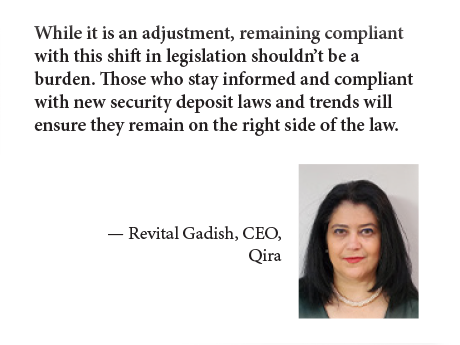— By Revital Gadish, CEO, Qira —
More than a third of Americans rent their homes, according to the U.S. Census Bureau. As such, the political landscape is evolving to fit their needs. An influx of new laws and proposed legislation has ensued, aimed at increasing transparency and fairness and avoiding financial hardship for tenants.
Much of the ensuing legislation is focused on security deposits. The strictest of the bills bans security deposits entirely, while others are capping the amount landlords can charge as a security deposit. So far, Texas, Florida, Illinois and California have enacted new security deposit laws, and many more cities and states are expected to follow suit.
This represents a sea change for landlords and property managers, who have long relied on security deposits as a safety net for covering potential damage to their properties.
While it is an adjustment, remaining compliant with this shift in legislation shouldn’t be a burden. Those who stay informed and compliant with new security deposit laws and trends will ensure they remain on the right side of the law. They’ll also find that offering security deposit alternatives will soon become crucial to maintaining a reputable and thriving rental business.
The Key Changes So Far
The following legislative changes are aimed at reducing the financial burden on renters, many of whom were previously expected to pay as much as three months of rent upfront. Based on median national rent prices, moving in could set renters back more than $6,000. In response, some jurisdictions have now capped the amount landlords can charge as a security deposit or require alternatives to security deposits, which makes housing accessible to a broader range of tenants.
- Texas passed Senate Bill 1783 in 2021. The bill allows renters to pay fees in lieu of a security deposit, establishes management guidelines and blocks property managers from offering or denying housing based on the renter’s choice. Additionally, the law states that property managers can’t collect damages from renters if they file for insurance coverage, and that landlords can’t file for insurance coverage if a court finds the renter isn’t at fault.
- Florida’s House Bill 133 went into effect July 1. The law allows property managers to offer fee-based security deposit alternatives and mandates some statutory conditions. Property managers cannot deny or approve rental applications based on the renter’s decision to pay a security deposit or fee. Additionally, the bill gives renters the right to switch from paying a fee to a traditional security deposit. Florida property managers must now provide written notification of the fee agreement’s conditions and sign a written agreement with the renter. The fee cannot be raised during the contract’s term.
- Illinois passed Senate Bill 1741, which will go into effect on Jan. 1, 2024. The law makes rental properties with less than five units subject to the same transparency laws as larger properties. It also requires all property managers to provide itemized damage statements within 30 days of a rental term ending or a renter leaving the property (whichever comes later) when withholding security deposit funds. Previously, this rule only applied to residences with five or more units.
- California has introduced Assembly Bill 12, which proposes reducing the state’s cap on security deposit amounts to one month’s rent. Property managers can currently collect up to two months’ rent for unfurnished rentals and up to three months’ rent for furnished rentals. The proposed bill doesn’t amend existing legislation about how deposits should be managed or why funds can be withheld.
- Some cities, such as Cincinnati, are considering legislation that would forbid traditional security deposits from being used or required. Although these laws are not the norm, they could have even more severe implications for property owners and operators — especially should they eventually become widespread.
How Can Landlords Best Adapt?
- Stay informed: Monitor updates to local and state laws to stay aware of any proposed changes that could affect security deposit regulations. Ensure you’re well-versed with your jurisdiction’s security deposit laws and amendments, as these will vary significantly by location.
- Update lease agreements: Review and revise lease agreements to incorporate new security deposit rules. Make sure the terms are transparent and clearly communicated to tenants.
- Embrace technology: Invest in property management software that can streamline the security deposit process, from accepting payments to generating detailed itemized deductions and tracking deadlines. Update or implement good record-keeping practices, which can be invaluable in the event of a dispute.
- Explore security deposit alternatives: Security deposit solutions services take over administrative responsibilities and legal liabilities from the property manager. These services allow renters to pay a monthly fee instead of a security deposit payment. This means property managers don’t have to worry about collecting and managing those payments or the protection they need if renters default or owe money.
- Educate staff and tenants: Train your property management team on the updated laws to ensure consistent and compliant handling of security deposits. Educate tenants about their rights and responsibilities regarding security deposits. Transparent communication doesn’t just prevent misunderstandings — it also creates a positive renting experience.
- Partner with legal and industry professionals: Collaborate with attorneys, legal consultants, industry associations and other professionals well-versed in real estate and rental laws to seek guidance and ensure compliance.
The rise of renter-friendly legislation around security deposits is a necessary paradigm shift toward greater tenant protection and fairness in the rental market. By staying informed and ensuring compliance in this evolving legal landscape, property managers can foster a positive reputation, build trust, retain tenants and mitigate potential legal disputes and penalties.
Revital Gadish is CEO at Qira, a New York City-based proptech company that manages rent collection, security deposits, pay-later solutions and other services for apartment properties and their tenants.


